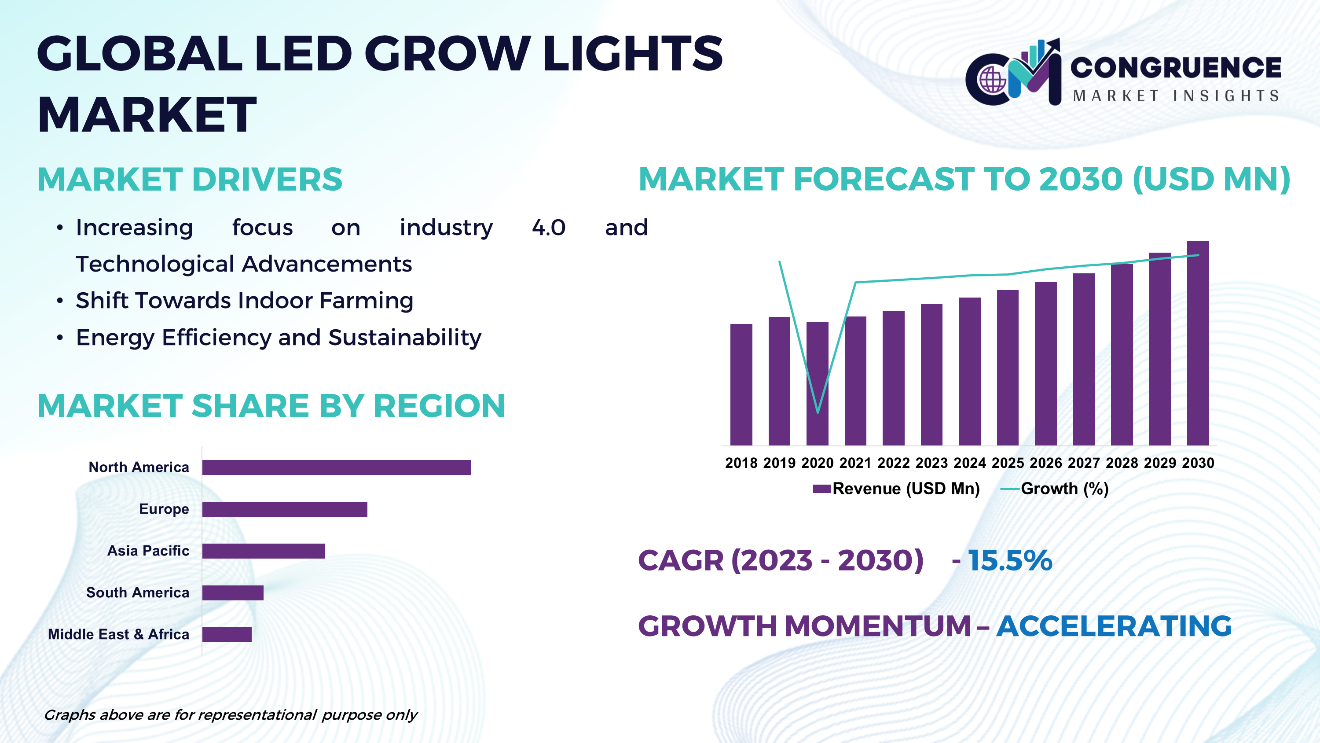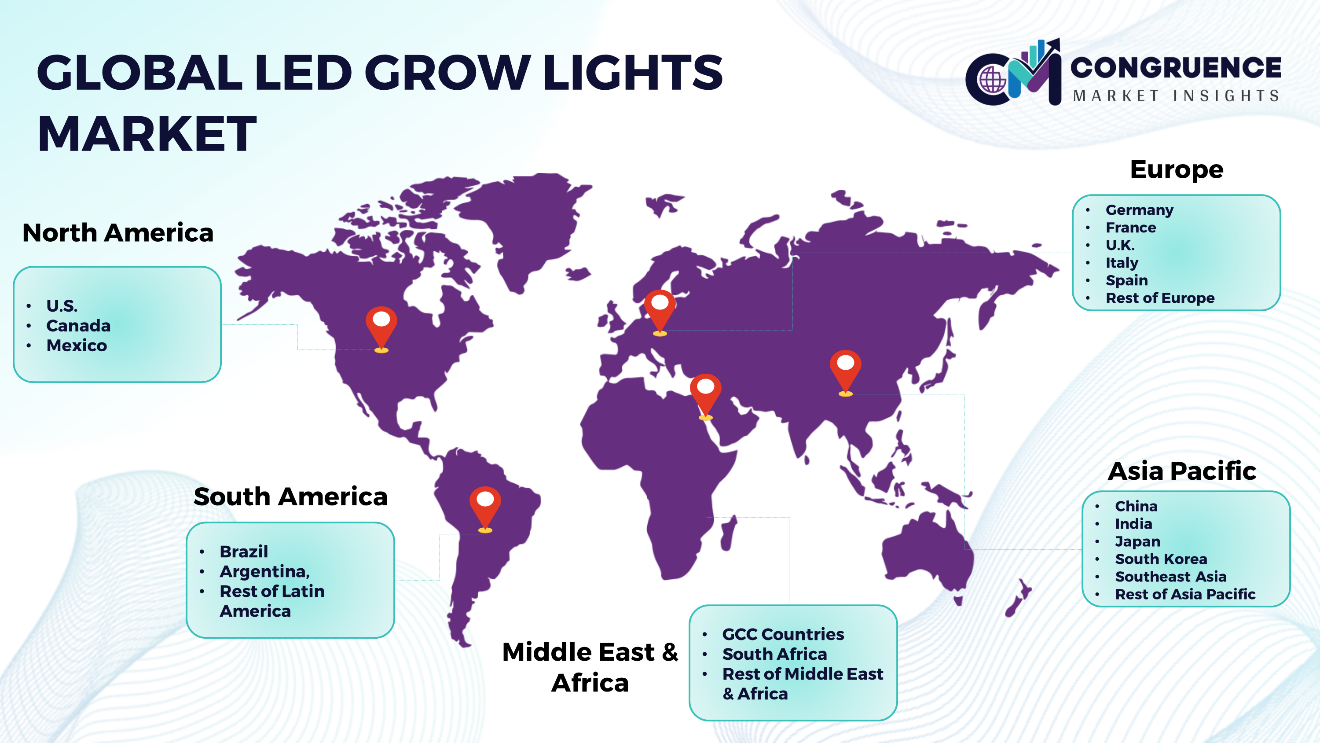Reports
The Global LED Grow Lights Market is expected to expand at a CAGR of 15.5% between 2023 and 2030. The LED grow lights market is experiencing rapid evolution driven by technological advancements and seamless integration with Industry 4.0 principles. Its fundamental components comprise high-efficiency LEDs, sophisticated optics, and intelligent control systems, facilitating precise spectrum adjustment and energy-efficient crop cultivation. This integration with Industry 4.0 fosters automation, remote monitoring, and data-driven cultivation techniques, thereby augmenting crop yields and optimizing resource utilization. Sustainability emerges as a central concern, with LED grow lights offering pronounced energy savings, diminished carbon footprint, and prolonged operational lifespan vis-à-vis conventional lighting methods. The landscape is characterized by robust competition, with prominent industry players prioritizing innovation, strategic alliances, and global expansion to harness the burgeoning demand for indoor agriculture solutions.

LED Grow Lights Market Major Driving Forces
Increasing focus on industry 4.0 and Technological Advancements: Continuous strides in LED technology, characterized by enhancements in efficiency, spectrum regulation, and durability, are instrumental in fostering innovation and widespread adoption within the industry. These advancements continually refine the capabilities of LED grow lights, positioning them as efficient and sustainable lighting solutions for agricultural applications.
Shift Towards Indoor Farming: The increasing inclination towards indoor farming solutions, prompted by factors such as urbanization, land scarcity, and climate variability, underscores the relevance of LED grow lights. As efficient and sustainable lighting options, LED grow lights play a crucial role in meeting the evolving needs of indoor farming practices, ensuring optimal growth conditions for crops regardless of external environmental constraints.
Energy Efficiency and Sustainability: One of the key advantages of LED grow lights lies in their significant energy savings compared to conventional lighting methods. By offering reduced operational expenses and minimizing environmental impact through lower energy consumption, LED grow lights emerge as pivotal contributors to sustainable agricultural practices. This aspect not only aligns with regulatory initiatives promoting energy-efficient solutions but also resonates with growers seeking cost-effective and environmentally conscious alternatives.
LED Grow Lights Market Key Opportunities
Vertical Farming and Urban Agriculture: The rise of vertical farming and urban agriculture initiatives in densely populated areas creates a demand for compact, high-efficiency lighting solutions. LED grow lights offer the flexibility to be integrated into vertical farming systems, rooftop gardens, and indoor urban agriculture facilities, enabling year-round crop production in urban environments.
Expansion into Emerging Markets: As awareness of the benefits of LED grow lights grows globally, there is a significant opportunity for market expansion into emerging economies. These regions often face challenges such as limited arable land, water scarcity, and extreme weather conditions, making indoor farming solutions powered by LED grow lights particularly appealing.
Sustainable Agriculture Practices: With increasing emphasis on sustainability and environmental stewardship, there is a growing demand for energy-efficient and eco-friendly solutions in agriculture. LED grow lights, known for their energy efficiency and long lifespan, align well with sustainable agriculture practices, presenting an opportunity to position them as environmentally responsible alternatives to traditional lighting methods.
LED Grow Lights Market Key Trends
· LED grow lights are evolving to allow precise tuning of light spectra, optimizing growth and yield by meeting specific crop requirements.
· Integration with IoT technology enables remote monitoring, data-driven decision-making, and efficient energy use in lighting systems.
· Adoption of smart lighting systems equipped with sensors and advanced controls enhances efficiency and adaptability in crop cultivation practices.
· Focus on energy efficiency and sustainability drives the development of LED grow lights with higher efficacy and longer lifespans, reducing environmental impact.
· Compact LED grow lights cater to the trend of vertical farming and urban agriculture, enabling year-round crop production in limited indoor spaces.
· LED lighting solutions tailored for horticultural applications provide optimal spectra for different growth stages, maximizing yield potential and crop quality.
· LED technology remains dominant in the grow lights market due to its energy efficiency, longer lifespan, and flexibility in spectral output.

Market Competition Landscape
The market competition landscape in the LED grow lights sector is characterized by intense rivalry among various industry players vying for market share. Competition centers around factors such as product innovation, quality, pricing strategies, and distribution networks. Additionally, strategic alliances, mergers, and acquisitions play a significant role in shaping competitive dynamics, driving innovation and market expansion.
Key players in the global LED Grow Lights market implement various organic and inorganic strategies to strengthen and improve their market positioning. Prominent players in the market include:
· Advanced Grow Lights
· Signify Holding
· Cree LED (SGH company)
· Heliospectra
· California LightWorks
· Optic LED
· Valoya
· OSRAM SYLVANIA Inc.
· Black Dog Horticulture Technologies & Consulting
· Grow Light Science LLC
· Mars Hydro
· Kind LED Grow Lights
· Bridgelux, Inc.
· SANlight GmbH
· King LED lights
· ViparSpectra
|
Report Attribute/Metric |
Details |
|
Base Year |
2022 |
|
Forecast Period |
2023 – 2030 |
|
Historical Data |
2018 to 2022 |
|
Forecast Unit |
Value (US$ Mn) |
|
Key Report Deliverable |
Revenue Forecast, Growth Trends, Market Dynamics, Segmental Overview, Regional and Country-wise Analysis, Competition Landscape |
|
Segments Covered |
· By Light Spectrum Type (Full spectrum, and Red-blue spectrum) · By Power Capacity (Low-wattage lights, Medium-wattage lights, and High-wattage lights) · By Application (Commercial greenhouse farming, Vertical farming, Indoor gardening, and Others) · By End-User (Residential, and Commercial) |
|
Geographies Covered |
North America: U.S., Canada and Mexico Europe: Germany, France, U.K., Italy, Spain, and Rest of Europe Asia Pacific: China, India, Japan, South Korea, Southeast Asia, and Rest of Asia Pacific South America: Brazil, Argentina, and Rest of Latin America Middle East & Africa: GCC Countries, South Africa, and Rest of Middle East & Africa |
|
Key Players Analyzed |
Advanced Grow Lights, Signify Holding, Cree LED (SGH company), Heliospectra, California LightWorks, Optic LED, Valoya, OSRAM SYLVANIA Inc., Black Dog Horticulture Technologies & Consulting, Grow Light Science LLC, Mars Hydro, Kind LED Grow Lights, Bridgelux, Inc., SANlight GmbH, King LED lights, and ViparSpectra |
|
Customization & Pricing |
Available on Request (10% Customization is Free) |
